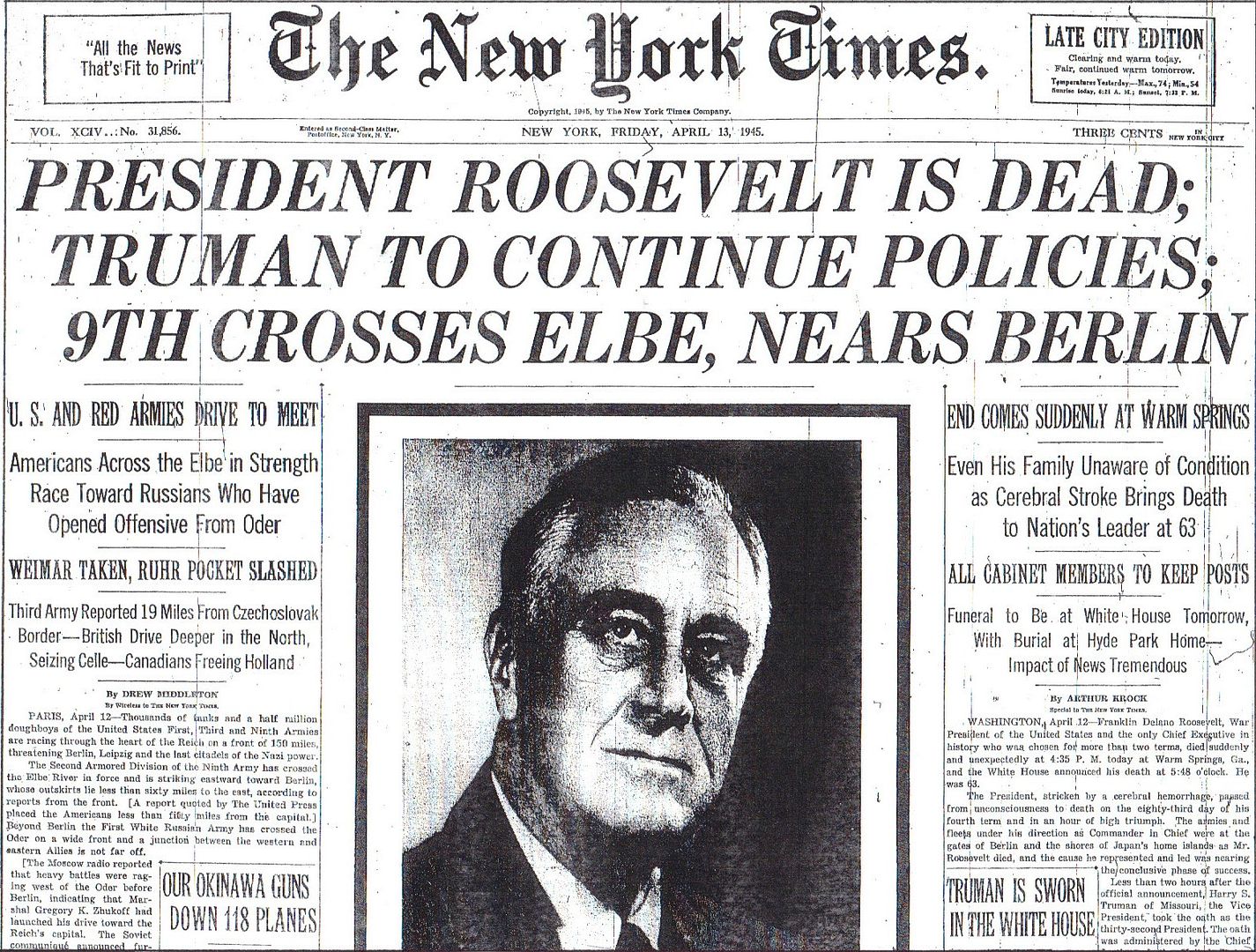
Posted on 04/13/2015 4:25:38 AM PDT by Homer_J_Simpson

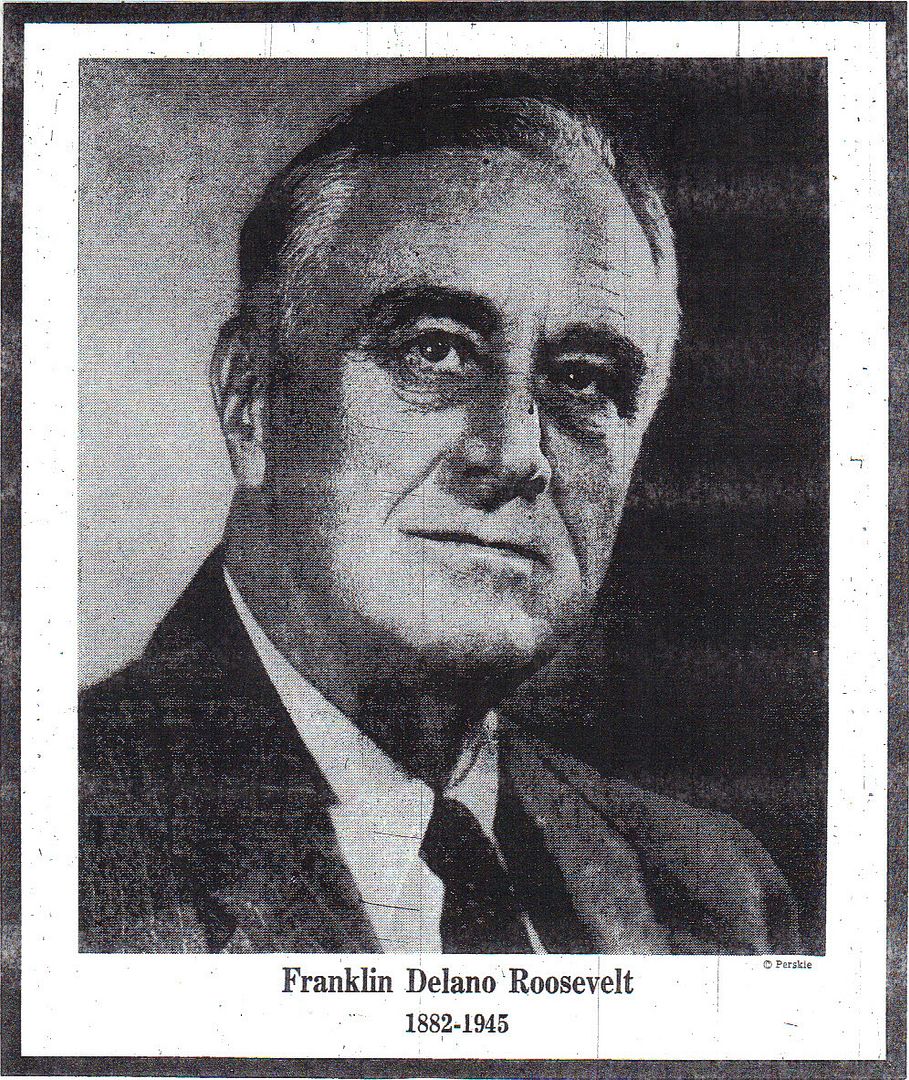
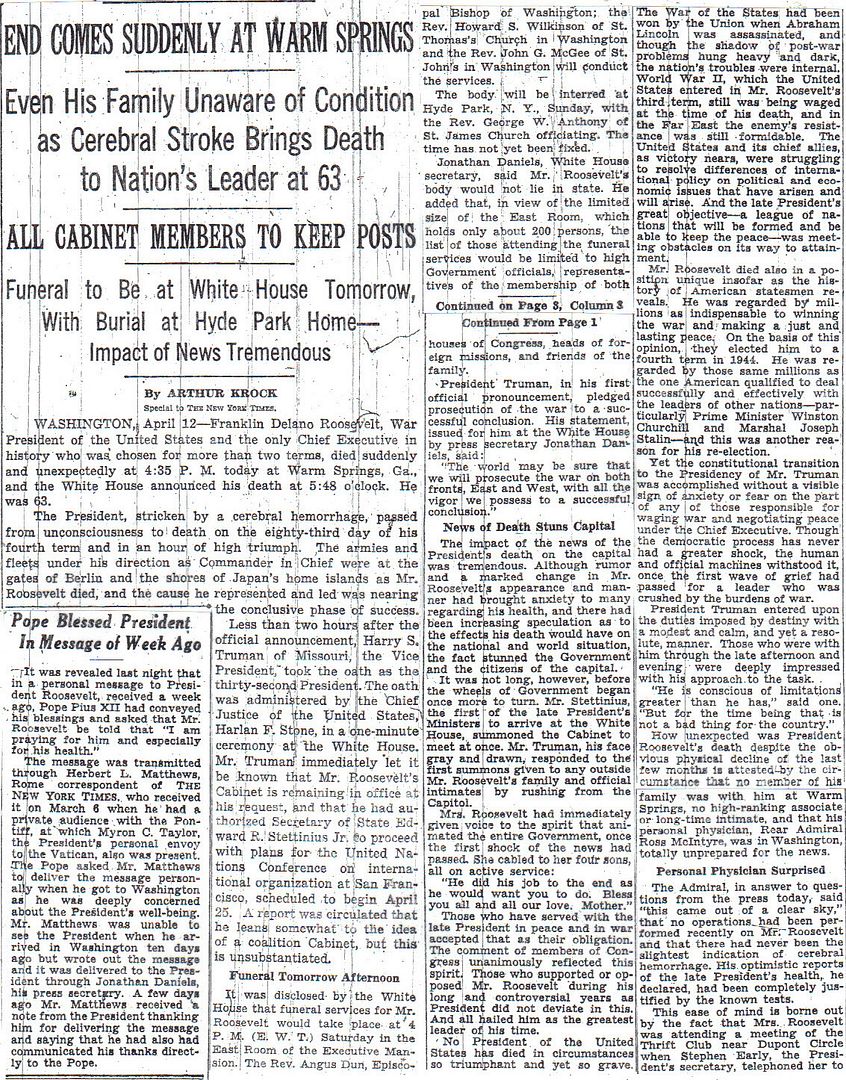
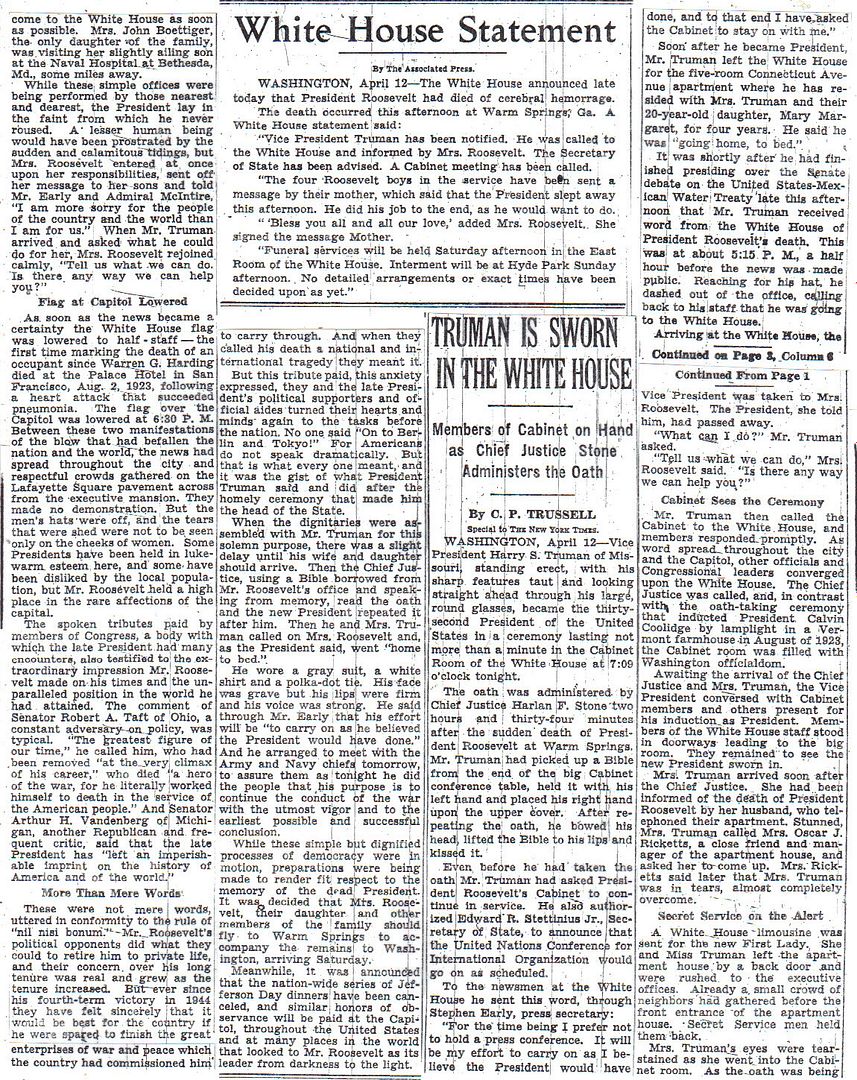
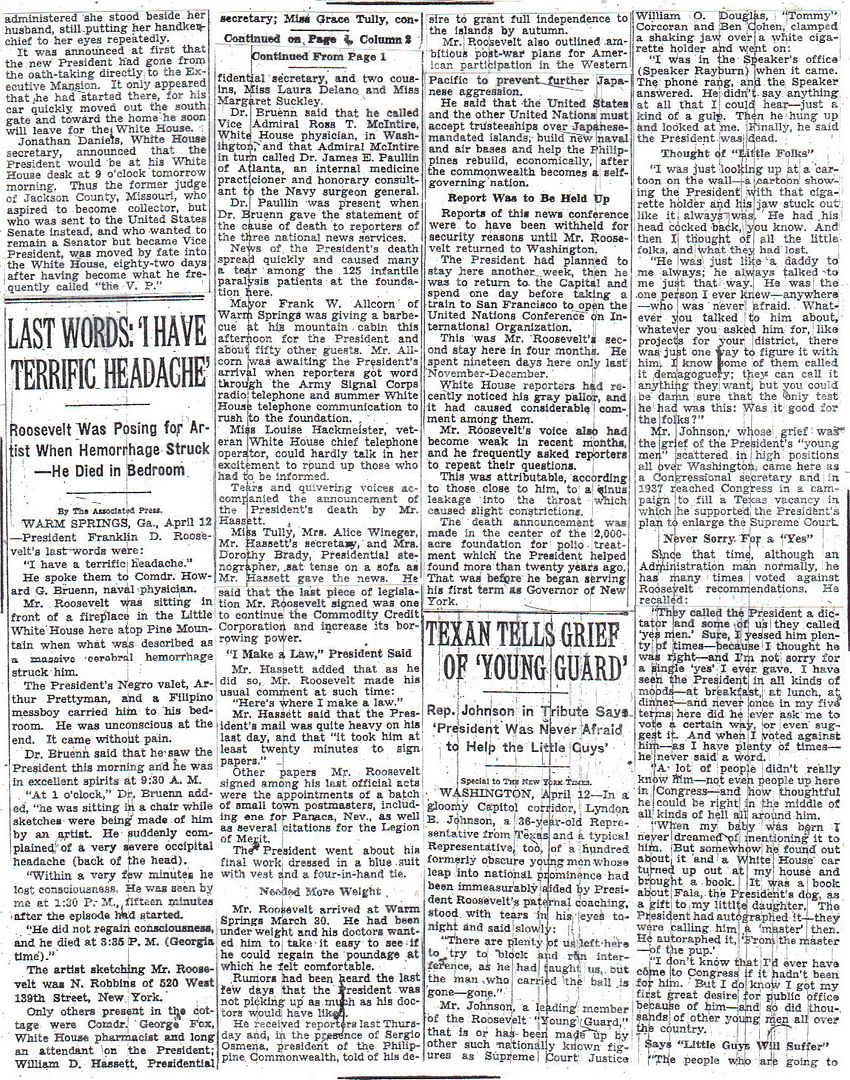
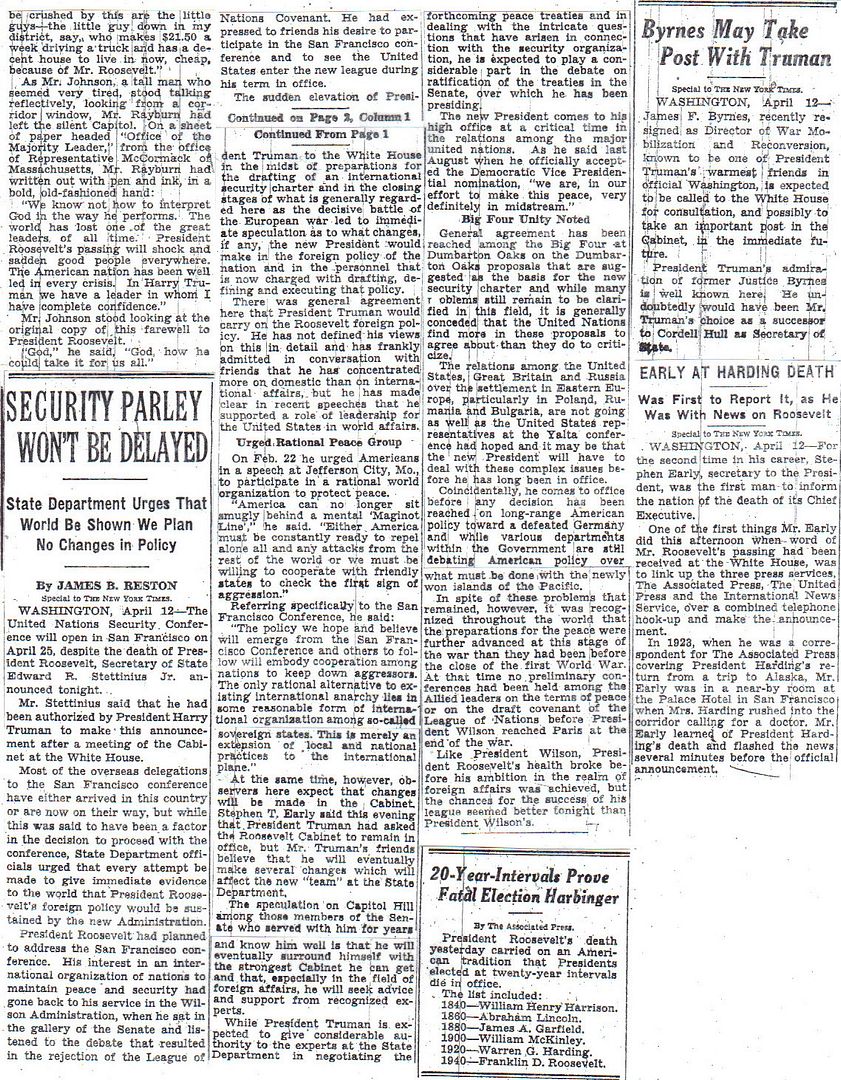
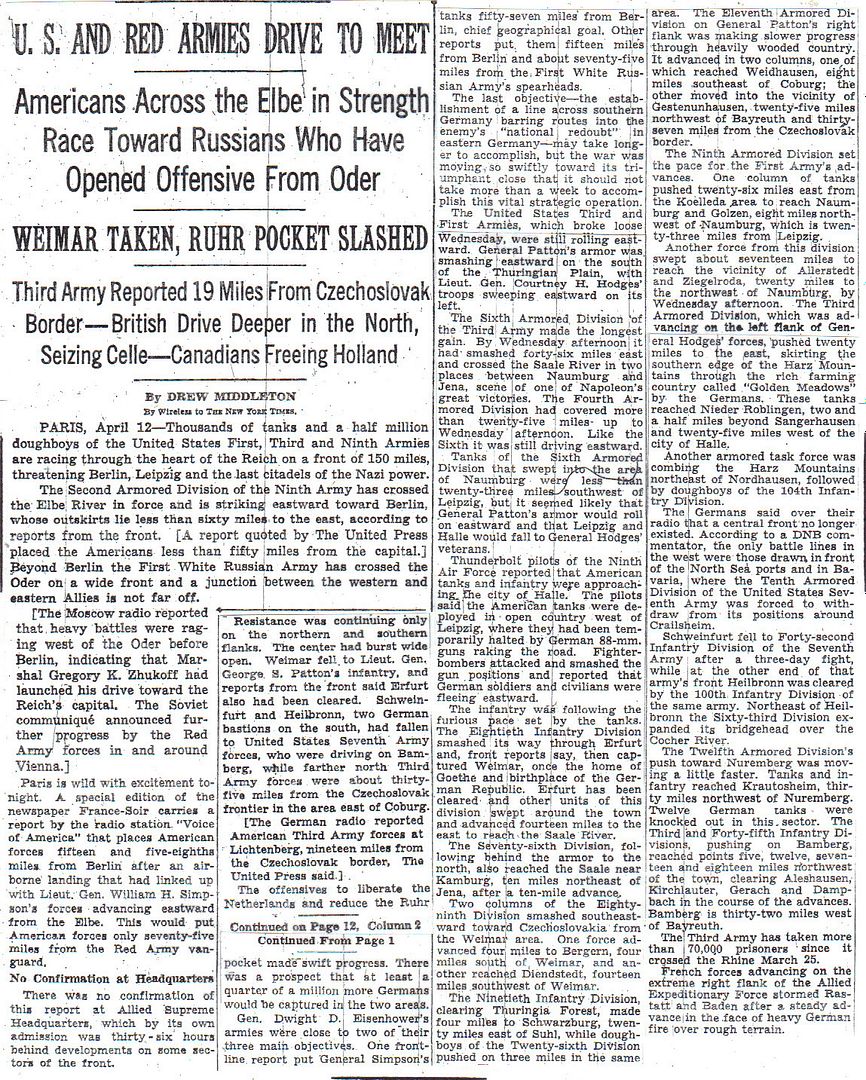
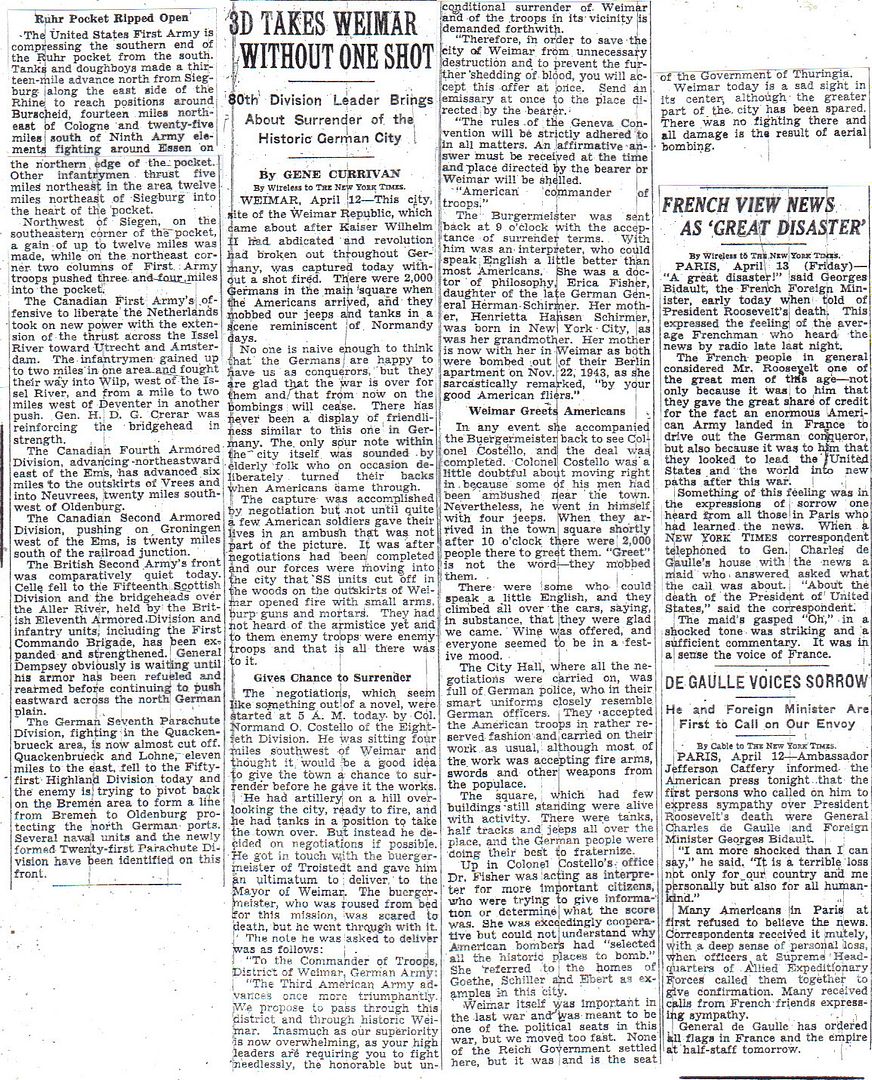
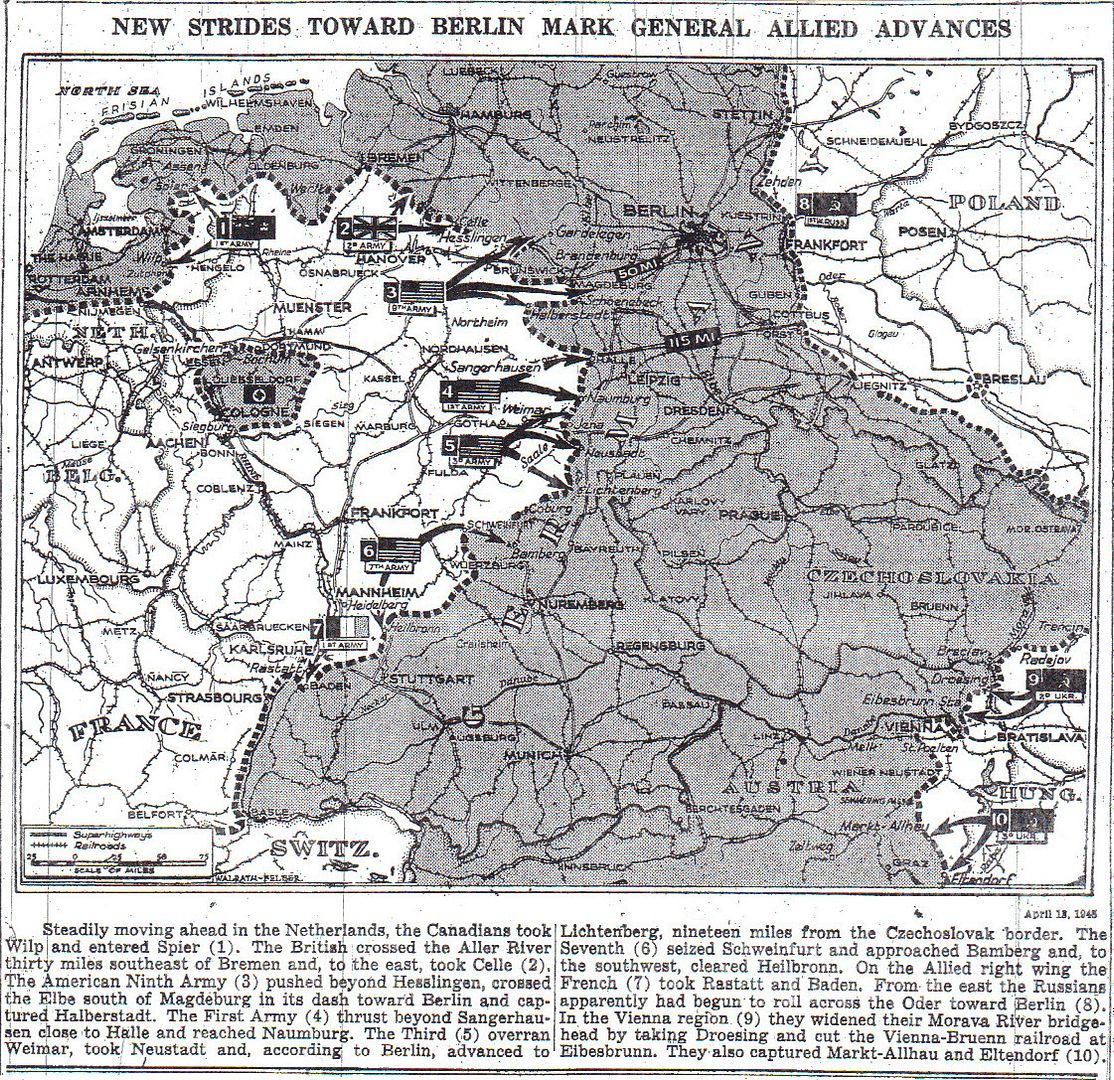
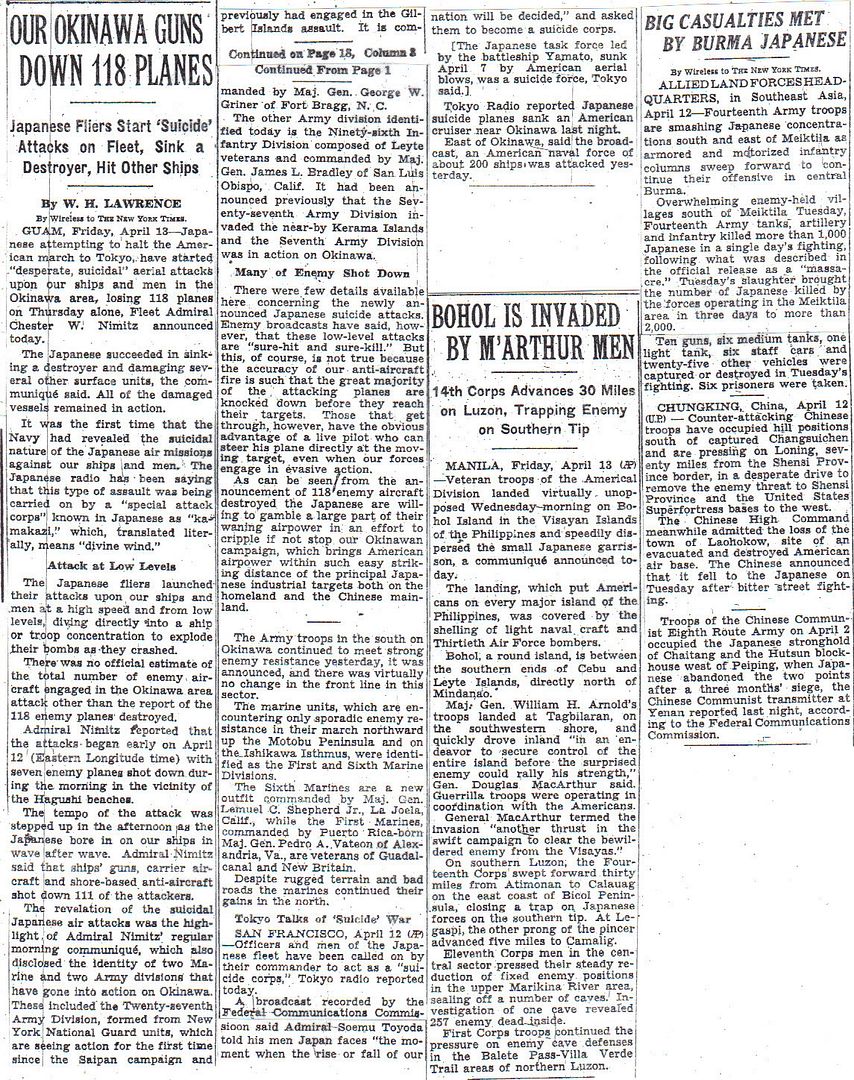
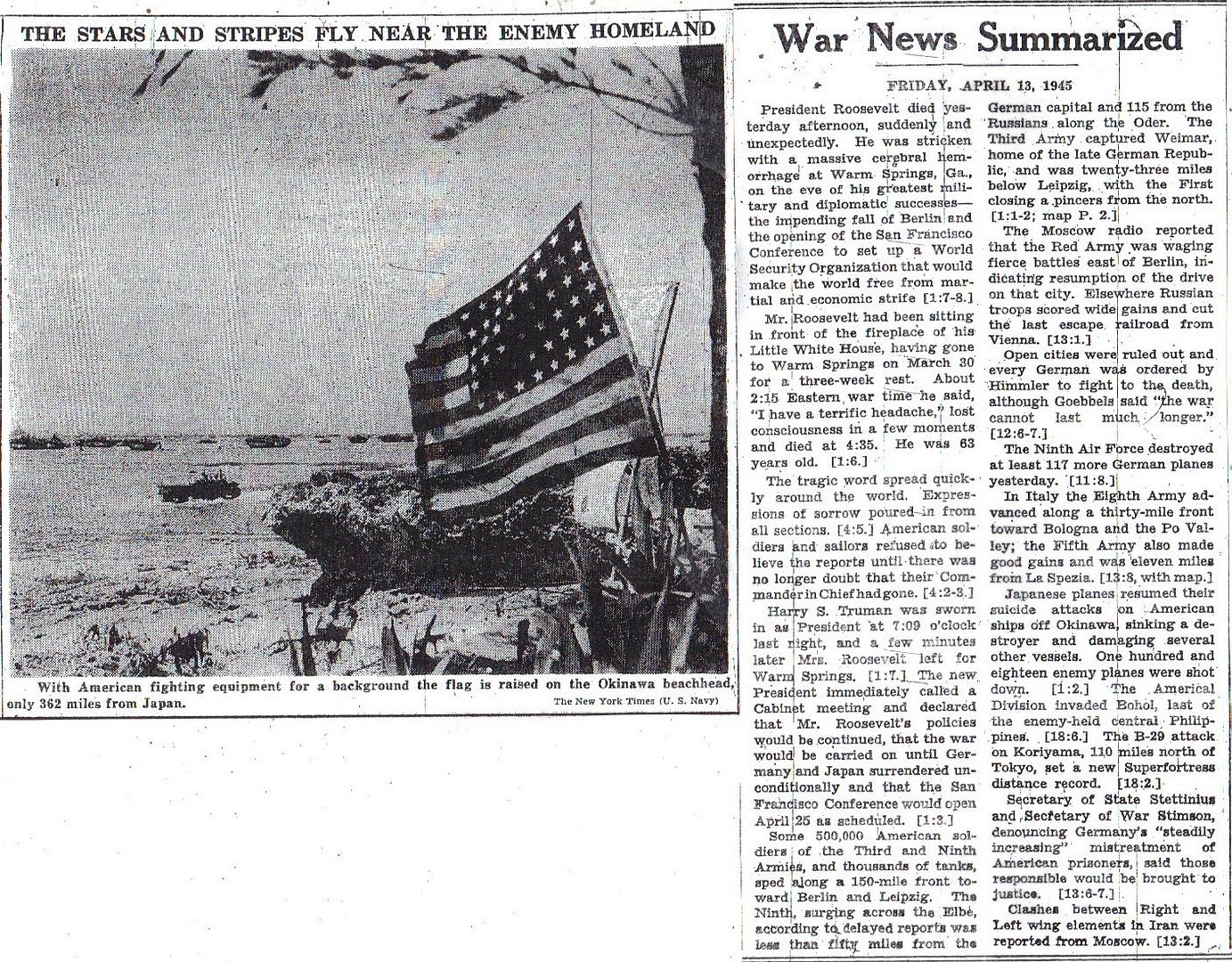
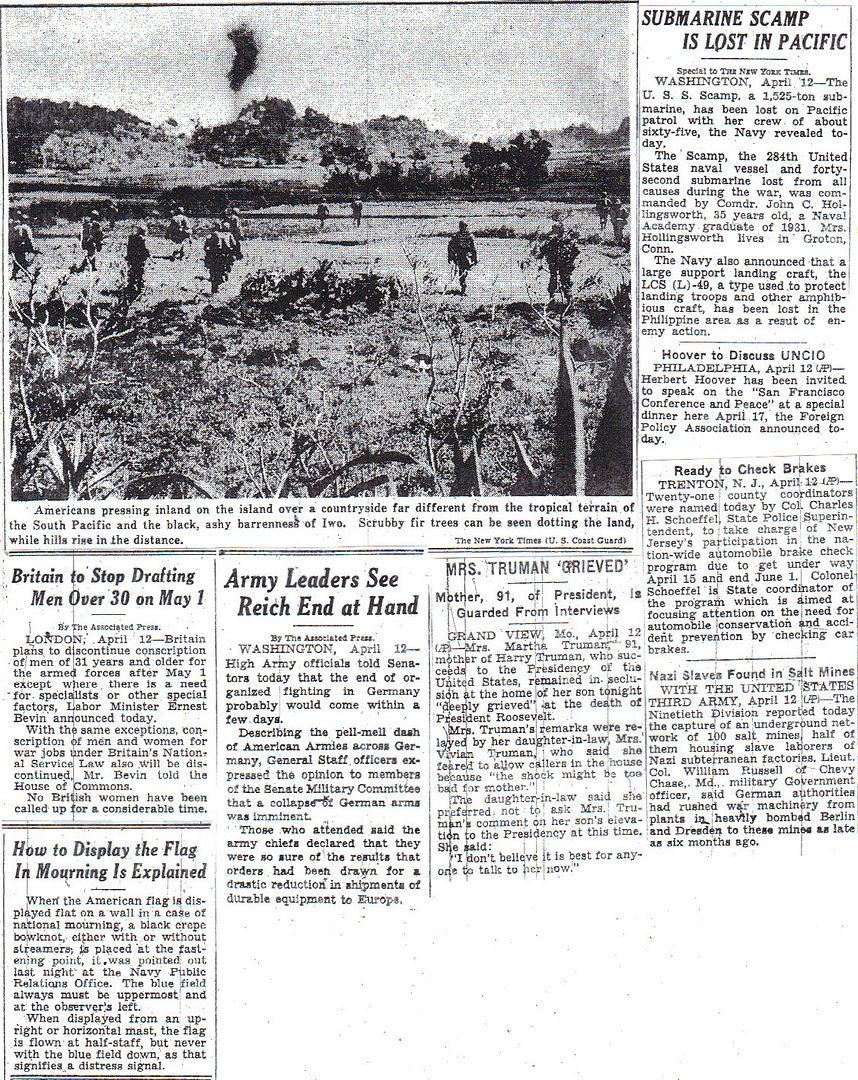
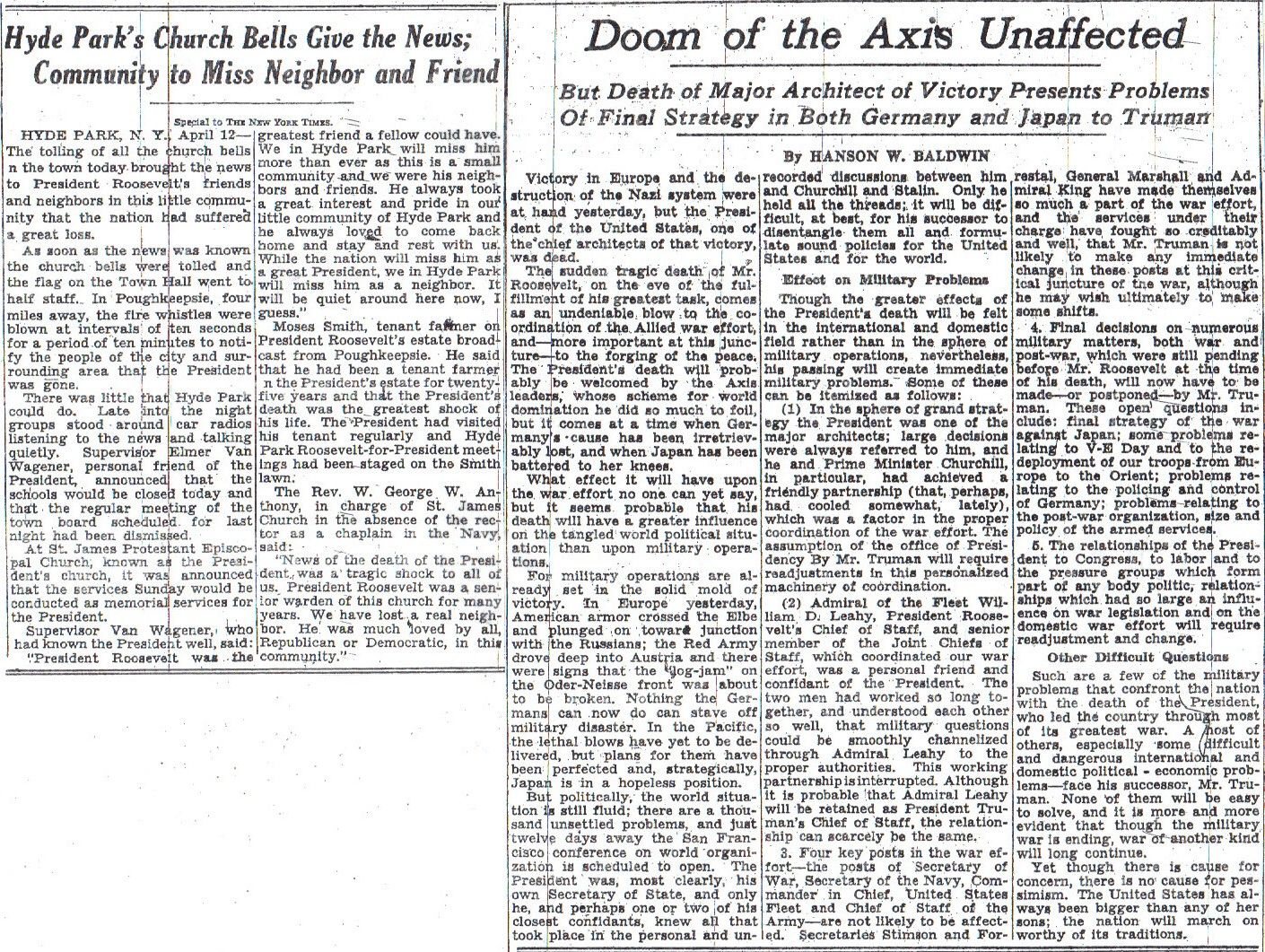
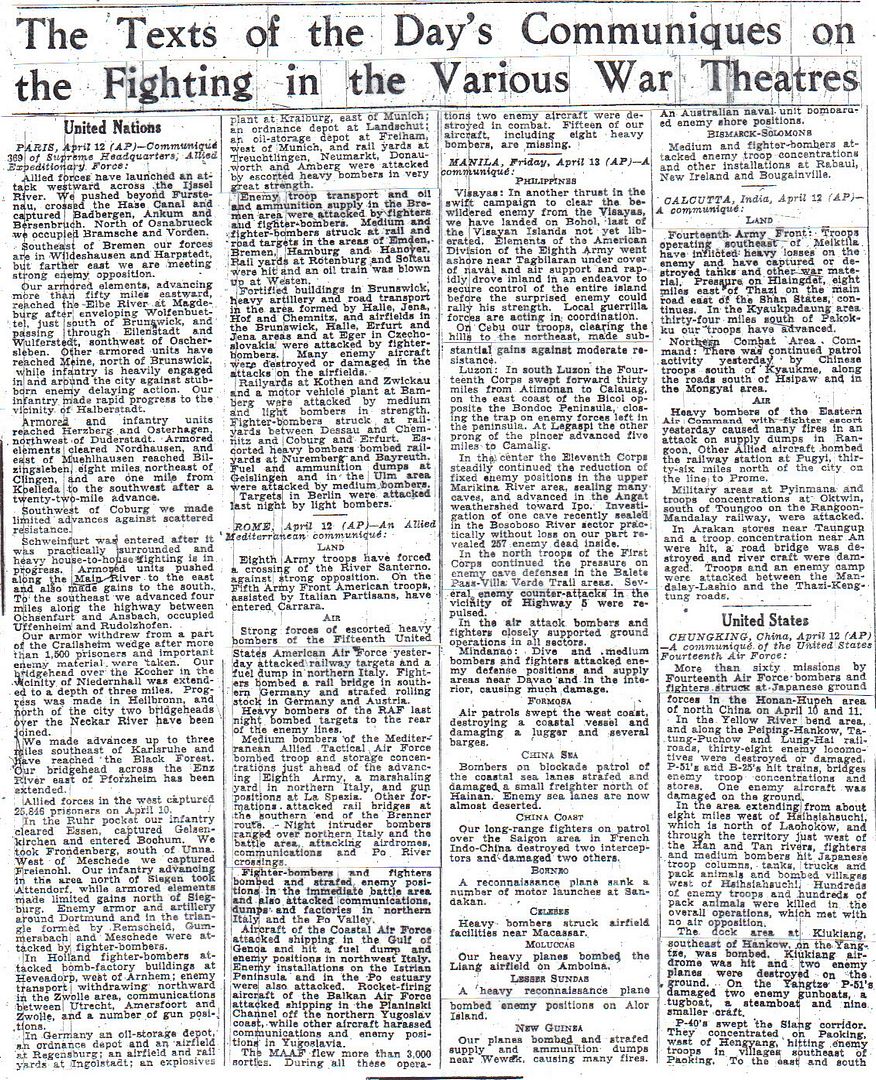
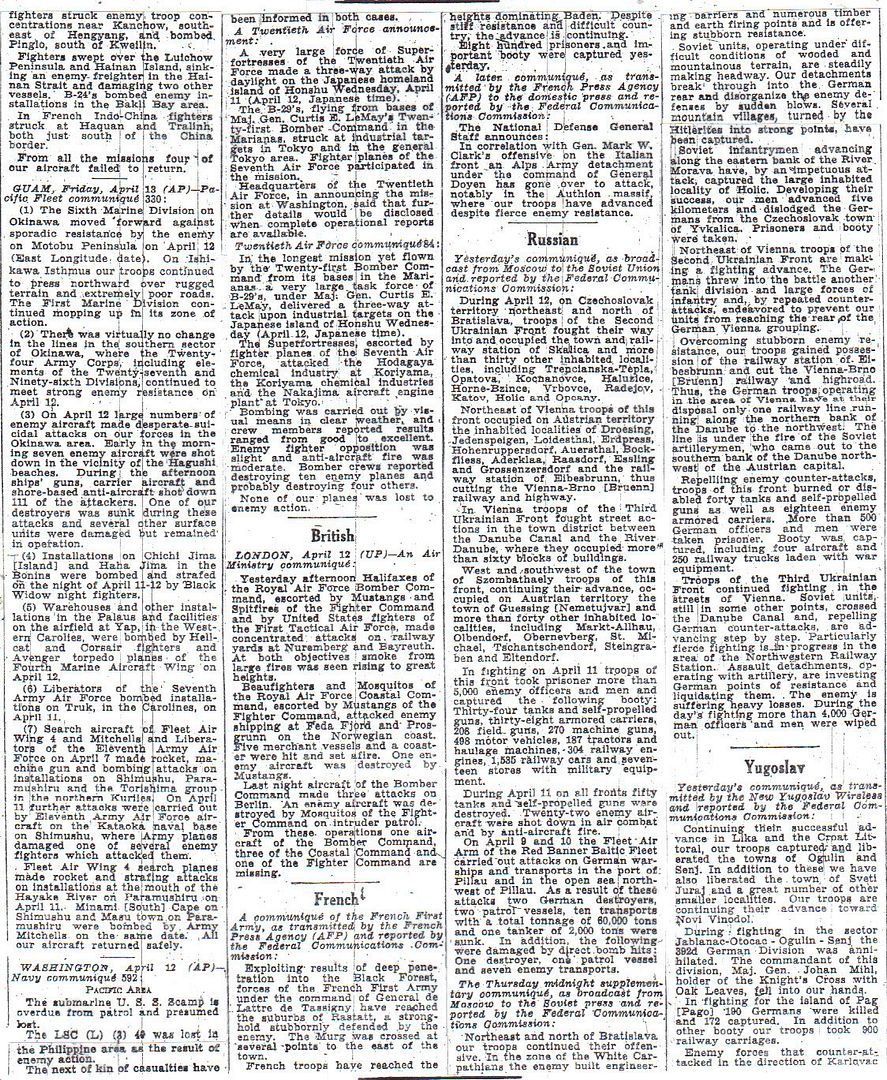
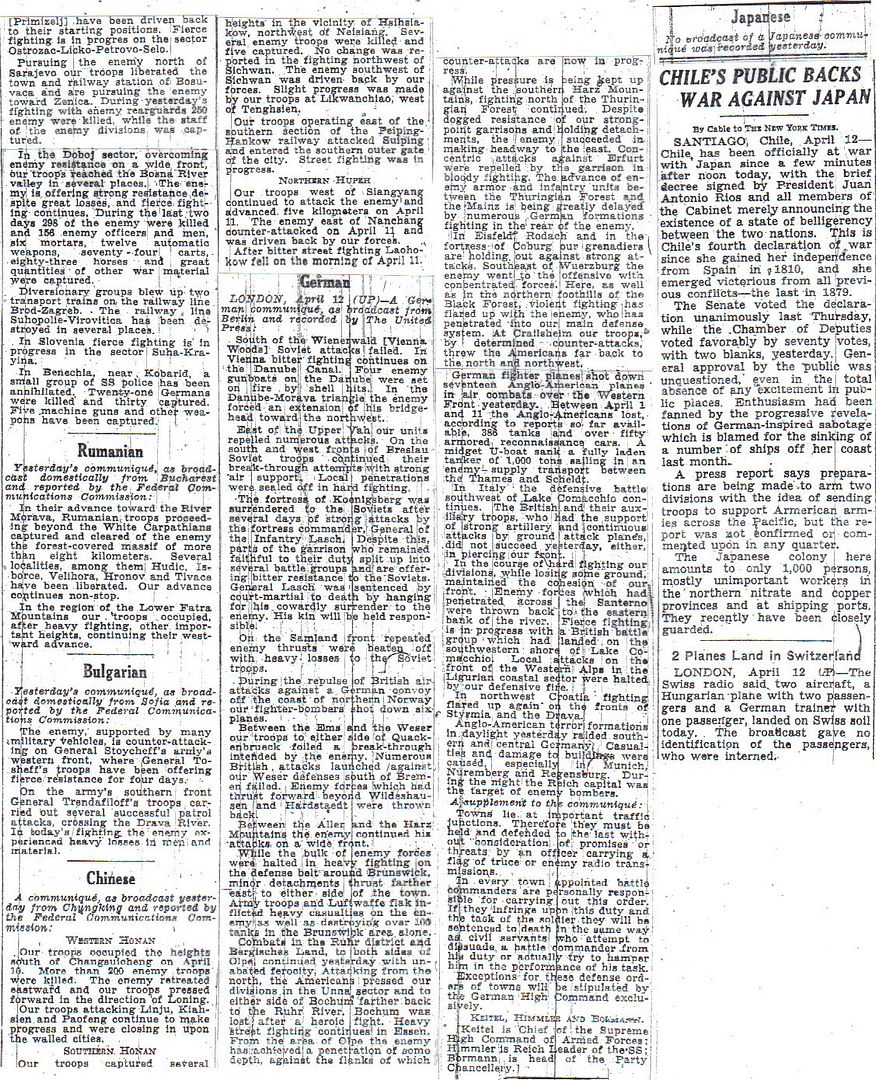
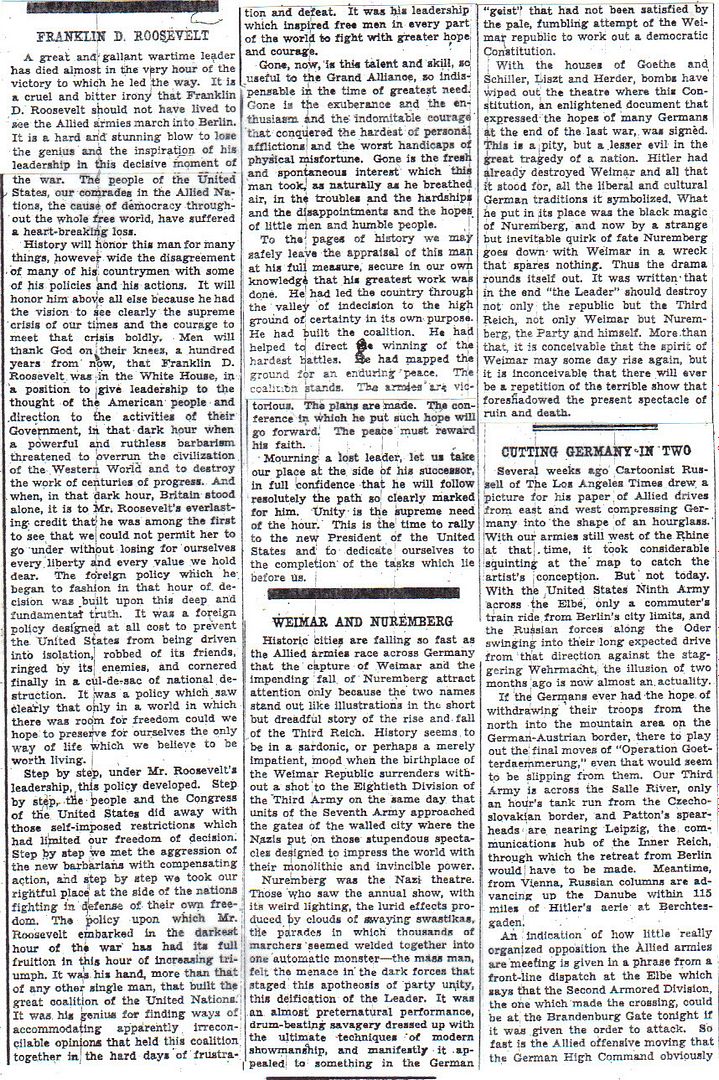
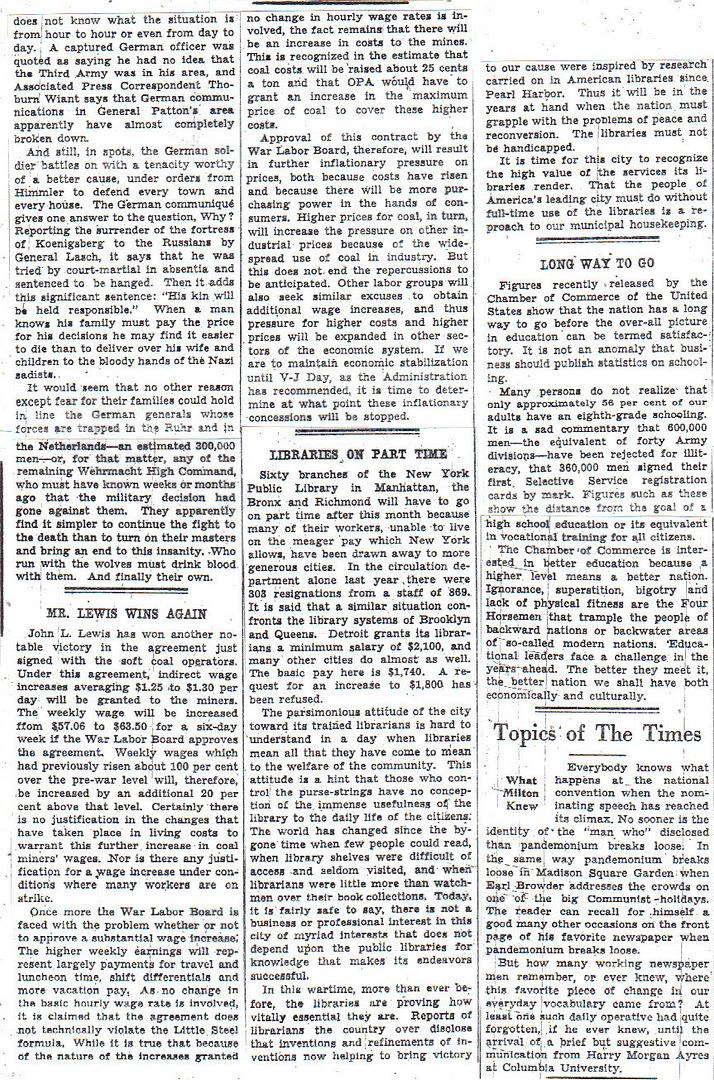
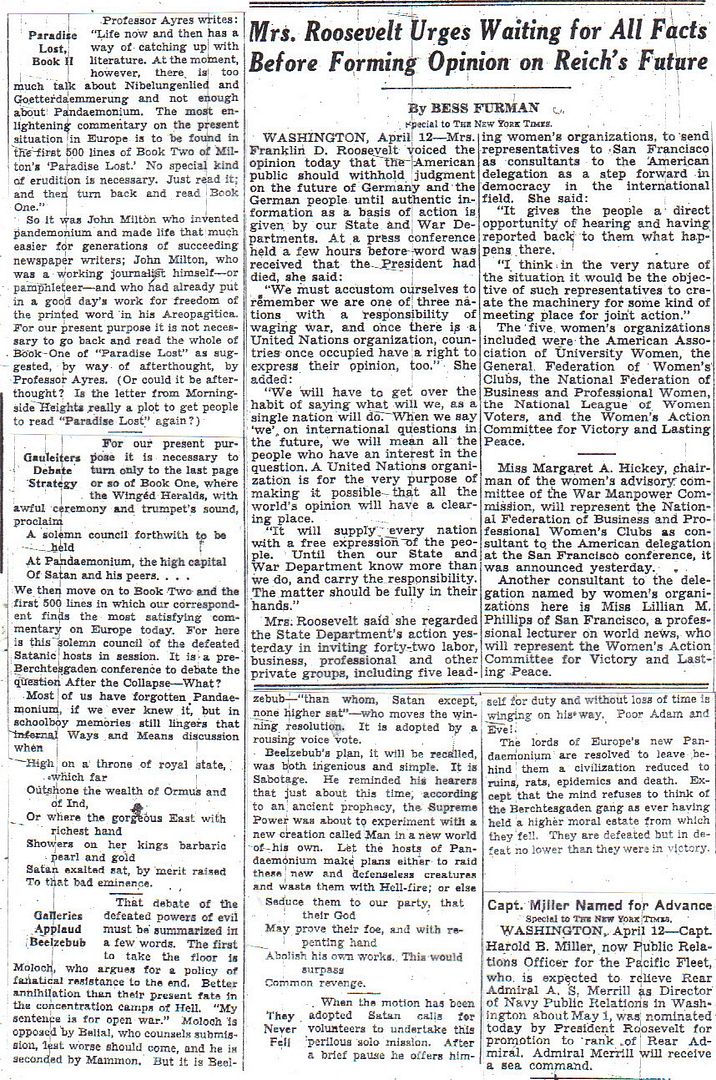
I really love those 83rd Infantry Division Radio News publications. Talk about concise, thorough reporting!
http://www.398th.org/History/Veterans/History/Streitfeld/HFH_19450413_Neumun.html
HELL FROM HEAVEN
Chapter 32
Mission 28 - A Tragic Day - April 13, 1945
By Leonard Streitfeld, Bombardier, 600th Squadron
It was Friday, April 13, 1945, a day I will never forget. Our crew had not flown for three days and the last mission I was on was with the crew that was shot down the following day. I couldn’t get that off my mind.
However, my twenty-ninth mission was at hand. The lights being turned on again awakened us and the familiar, “You’se eat now and brief in 3/4 hour.” It was 4:00 A.M.
When the lights went on, my radio also went on. It took about thirty seconds for the tubes to warm up and the first thing we heard was the announcer saying, “Word has just been received from the United States that President Roosevelt is dead.” This was a shocking and demoralizing bit of news and no one was in the mood to fly after hearing it but we had no choice. The only thing that everyone was talking about was the news of his death.
We went through the usual breakfast and briefing. The target for the day was the marshalling yards in Neumunster and we were informed of a new type of highly explosive bomb called an RDX that all aircraft would be carrying. We were curious about this new bomb and I was hoping to see the bomb strike and get some pictures of the bombs when they exploded. Some of the bombs had markings on it like “To Adolph from FDR.” These “greetings” were in his memory.
There was no charted flak on our maps and so we didn’t expect a rough mission. This was fine with us.
The flight to the target went off smoothly. Soon we approached the target area, turned on the IP and went on the bomb run. Scanning the sky no flak was seen which always made me feel good and something less to worry about. We were flying in the low squadron and when we reached the target, the lead plane dropped its bombs and all others followed. The bombs in each plane were released at intervals making a train of bombs that streaked towards the marshalling yards making a direct hit.
Taking place in a plane in the lead squadron flown by Pilot Sam Palant and unbeknown to us, a drama was taking place. Palant asked for a bomb bay check to see if all the bombs were released. The Radio Operator, Sgt.Paul Brown took a look and immediately called back on the intercom that none of the bombs had left the plane.
The Bombardier, Lt. Nick Maraneas, who was flying his first mission with this crew, and Palant had a hasty discussion and it was decided to pick a “T.O.” (target of opportunity) nearby and release the bombs.
The target picked was in the town of Bad Segegerg about 20 miles away from Neumunster. It would take five minutes to reach it. However, during this time the Pilot tried to reach the Bombardier to tell him to hold up on the drop. The message was never received and in a few minutes the bombs were salvoed.
Within seconds after the salvo, about 100 or 200 feet below the squadron there was a tremendous orange flash. This was followed almost simultaneously by the loudest explosion we had ever heard that sent shrapnel in every direction. I just couldn’t believe it was flak since none of us had ever experienced anything like it before. The planes closest to the explosion sustained the most damage. Two of them with the engine and wings ablaze dropped out of the formation and started to go down. Many chutes were seen as the crews bailed out.
Four other planes were able to make it back closer to the front lines two landing in Germany. Two planes made it to France but one of them, whose pilot was Lt. Charles Merritt, had fires in the bomb bay, right wing and # 4 engine. He dove the plane down from 20,000 ft. to 8000 feet before he ordered everyone to bail out. Moments later the plane exploded.
In our plane a large piece of shrapnel came thru the Plexiglas window where I was sitting and landed past the cabin and near the catwalk. Another piece came in through the navigator’s dome just over my head. Both pieces missed me by inches and how I didn’t get hit is beyond me.
One more piece came in thru the pilot’s window, narrowly missing Al and Hank, leaving a large hole for them to look through the rest of the mission. Not only were they both very lucky but so was the entire crew. Thank God they were not hit because flying without pilots could be hazardous to your health.
There are many accounts by those who had to bail out of their plane and into enemy territory. A book could be written about their experiences but some should be told at this time.
Ed Steele, Waist Gunner on Martinek’s crew, who parachuted out of his plane and landed in a field near some woods where he tried to hide, told a terrifying story. However he was found by a group of civilians. An old man with a shotgun came to him as he was lying on the ground and held it by his side to shoot him. He warded off the old man by grabbing the barrel of the rifle and directed it away. Shortly some German soldiers came and relieved the shotgun from the old man who proceeded to kick Steel still lying on the ground.
The soldiers searched him for weapons and was then asked if he had one. Each time he told them he didn’t, the officer in charge hit him in the face. When they were sure he had no weapon they walked to the officers staff car where he took out a shovel and gave it to Steele who was told to start digging his grave.
When it was deep enough the German officer in charge lined up a firing squad with machine guns and was about to order them to shoot. Steele, in a last minute attempt to save his life, took out a picture for the officer to see. He looked at it and in good English asked who the people in the picture were. Steele told him it was a picture of his wife and two year old daughter.
He looked at it and then went back to the firing squad to speak to a sergeant in German. The officer came back to Steel and asked again to see the picture and asked if it really was his wife and daughter. He was told that it was. The officer then told him that he too had a wife and daughter.
Once more the officer went back to the firing squad and was ready to order them to fire when again he came over to Steele and asked him if Americans took prisoners. Steele said, “Certainly they do.” He was asking Steele about his family one last time when suddenly the officer ordered his men to put their guns down. Steele was finally taken to a jail in the town and the next day was reunited with most of his crew.
Another story should also be told about what happened to Paul Brown. After he bailed out of the plane and parachuted down, he was taken prisoner. He was taken to the city of Hamburg by train where a second train would to take him to a German Air Force Interrogation Center on the other side of Hamburg.
When they arrived, Brown was astounded by what he saw. Wherever he looked there was destruction with not a single building standing and few walls. Everything seemed to be just an endless pile of brick and rubble due to the pounding it was given by the 8th Air Force.
While on a platform waiting for the train to take them to the Interrogation Center the air raid sirens sounded. The 8th Air Force was coming for another bombing mission. The guards took Brown along with the other American Airmen and hustled them to a railway tunnel that was used as an air raid shelter.
In the tunnel, which had little light, were several hundred civilians who were able to recognize these American airmen by their flying suits. They then turned into animals by screaming, shaking their fists, cursing at them and spitting in their faces. There was no doubt that if the 8th Air Force had dropped a single bomb, they would have died in the railway tunnel. Fortunately, the 8th Air Force was just flying overhead en route to another target and no bombs were dropped.
When the all clear signal sounded and they boarded a train to leave the city for the Interrogation Center, as the train was slowing pulling away Brown and the other airman saw 3 American airmen hanging on lamp posts along side of the tracks, a sight they never forgot.
When our planes returned to the base, we found out that when the bombs were released by Palant’s plane, within seconds, two bombs touched each other on the way down and exploded. Of the ten aircraft in the 601 Squadron, only 4 made it back to England and our base in Nuthampstead.
Each mission seemed to have it’s own set of frightening circumstances that would come on unexpectedly and put us in jeopardy. This mission certainly did that and we were extremely lucky to have come out of it safely. All of us kept wishing more than ever that the war would end soon.
The map on the wall of the officer’s club showed that the front lines were getting closer and we were looking forward to the day they would touch. It wouldn’t be far off. However, we still had some deadly missions to fly and everyone hoped they would live to see it.
HELL FROM HEAVEN by Leonard Streitfeld, Hammonton, New Jersey. Library of Congress Catalogue card number: 94-092215. HELL FROM HEAVEN is available in the 398th PX.
The funeral train heading back to Washington from Warm Springs had a Soviet spy aboard.
Lauchlin Bernard Currie (8 October 1902 - 23 December 1993) was Administrative Assistant to President Franklin Delano Roosevelt, and a Soviet spy.
http://www.conservapedia.com/Lauchlin_Currie
Looks like Currie was a Harry Dexter White protege.
Bear in mind that the troops know nothing of the Atomic Bomb. Once Germany is finally defeated, most expect to be shipped to the Pacific to invade Japan. It is an extremely delicate issue because of the U.S. custom at the time not to rotate troops for defined tours of duty. Some troops have been engaged in combat since North Africa, others are new arrivals.
Marshall addresses the delicacy of the issue in a confidential cable to Ike on 4/14.
Do you have a copy of the cable?
Still, I'm very happy to see that these long-suffering Dutch are finally being liberated. I saw a few days ago that the top German in the Netherlands is allowing food into his area. No doubt he knows how the war will end and there has been all that talk about war crimes and accountability . . .
April 14, 1945 [Radio No. W-68632.] Washington, D.C.
Restricted
Personal to Eisenhower from Marshall.
Dear Eisenhower:
It is becoming increasingly apparent that the task of readjusting the Army and promptly releasing to civilian life those people who are surplus to the needs of the Japanese war is one which will demand the most unselfish and conscientious efforts on the part of everyone. I fear that the weight of public opinion in the United States will be such that unless the task is handled properly, we may be forced to take measures which will interfere with redeployment and result in a prolongation of the Japanese war.
It is important that we discharge promptly every man who can be spared. It is of equal importance that these men be selected with extreme care. I think it is very important from a psychological point of view that the first shipments of men to be demobilized should be drawn from combat troops and from the divisions deepest in Germany,2 resorting to air transport service to get them to points of ship embarkation, if necessary.
The manner of selecting and preparing units for redeployment is also of critical importance. Upon the conclusion of World War I, it was too often the case that the most convenient unit was the one shipped back to the United States for demobilization at the expense of a unit which was more deserving. This must not happen again. Furthermore, even though it involves a lot of hard staff work and inconvenience to commanders all the way down the line, those units which are shipped direct to the Pacific theaters must contain to the maximum extent practicable only those people who are least eligible for discharge.
I have in mind that many units can be maintained considerably below authorized strength without harm to your military requirements. Those for reshipment through continental United States can be filled up with replacements here.
I wish that at the proper time you would advise all your people of my deep personal concern as to the responsibility of all commanders for a thorough and intelligent application of our readjustment and redeployment regulations. The Army will be severely criticized unless everyone gives his best efforts to this problem. Also please see that staffs do not get too much into blue print designs without sufficient thought for human reactions.3
Document Copy Text Source: Records of the War Department General and Special Staffs (RG 165), Records of the Operations Division (OPD), 370.9, Case 127, National Archives and Records Administration, College Park, Maryland.
“I share your concern over the human problem involved in redeployment,” replied Eisenhower. “I recognize that these problems must be solved promptly and with human understanding if the Army is to retain the confidence of the people at home for the continuation of the war against Japan as well as for the future. Our soldiers must be convinced that the system is fair and impartial.” Transfer of troops was under study at his headquarters, where a control group was to give “undivided attention to assure a complete coordination of effort and to give appropriate consideration to the human element.” (The Papers of Dwight David Eisenhower, ed. Alfred D. Chandler, Jr., et al., 21 vols. [Baltimore: Johns Hopkins University Press, 1970-2001], 4: 2621-22.) See Marshall Statement to the Troops, May 8, 1945, Papers of George Catlett Marshall, #5-118 [5: 173].
I think I’ve seen this correspondence in Richard Frank’s “Downfall.” Frank says the result was a “points system” that discharged soldiers based on a complex formula of days of service, days overseas, and days in combat. Units were not demobilized, but individual soldiers were. Frank says it worked like acid on the fighting effectiveness of American divisions, as the guys with the most points were also the experienced NCOs. The glue that held the army together.
I would agree with Frank it degraded units that were earmarked for combat. That could have been a huge issue for the invasion of Japan.
I don't think it was news in the Frank book, but the Japanese had figured out the invasion of Kyushu was the logical first step before an invasion of Honshu and were reinforcing it on a massive scale. I don't believe any European units were slated for Olympic, but still it would have resulted in casualties on a huge scale, dwarfing the Philippines or Okinawa. Certainly, had Olympic gone ahead and experienced severe casualties, that would have hastened redeployment from Europe. I have no idea if that would have resulted in cancelling the point system process of mustering troops out.
Cancelling the point system would have been a political disaster for a new administration with no reserve of public good will.
Olympic did not have any European units slated to participate, but the casualties would have been fearful. So too would the Japanese loss of life. Consider that by December, most of the Japanese residents would be literally starving to death.
I don’t think Coronet would have been as costly. By then (April 1946), if the Japanese had not surrendered, half of the population of Honshu would be dead from starvation. Yes, literally millions of them. The rest would not have had the physical stamina to fight.
And Hokkiado and the northern part of Honshu would be Communist “North Japan.”
Do you think if the casualties from Olympic had been as horrific as some have concluded, the public would have turned away from unconditional surrender to want a negotiated peace?
Interesting clip about the “20-year interval” thing. It would continue with JFK. The pattern was broken with Ronald Reagan survived his assassination attempt.
Maybe. The internal debate might have delayed Coronet from April to mid summer. By then, another 20-40 million Japanese would have died from starvation, leaving only about 15-20 million alive, and they might finally have surrendered.
I’m also guessing Stalin would actually have been happy with Hokkaido and left us the rest. He was really after China and Japan was more or less gravy. And while Hokkaido was much less heavily defended, the Soviets had NO experience in amphibious operations. Also they had no experience in fighting off waves of kamikaze attackers. It would have been tough and expensive for them to carry it out. And that’s all they could have done. They may not have even tried, and just concentrated on China while we busied ourselves in Japan.
Frank’s book makes it pretty clear that the Japanese were already on rations less than the daily requirement for subsistence in the summer of 1945. Our submarine, aerial and mining blockade had not only completely cut off Japan from sources of supply on the mainland, but the mining operations were so successful we had cut the internal coastal shipping links. The weak rail links were subject to cutting at a few points. In other words, all Japanese economic activity was about to cease no later than October. The death toll in the winter of 1945-46 would have been staggering. I think of the siege of Leningrad, but on a national scale.
By January, the weekly death toll could have easily been in the millions. And with the breakdown of public health and all those corpses... Not a pretty picture for Japan if they don’t surrender in August. But the upshot could well be Communist China in 1947 instead of 1949, and a unified Communist Korea.
And that’s as far as you are going to get without a flagrant violation of Henkster’s Law.
Without violating henkster's law, I do think Olympic would have to have been postponed to think through the problem of dealing with so many more Japanese troops than anticipated, despite MacArthur's dismissive attitude about the intelligence.
I did a little surfing and one scary fact I saw is that if the Japanese had not surrendered after Nagasaki, the U.S. was prepared to use multiple atomic bombs in Olympic.
Arnhem was opposite the northern extent of the Siegfried Line, which it was the objective of Market Garden to flank. This is why it had to be a bridge too far if it was going to work at all.
In 1979-1980, there was a nationwide intercessory prayer movement among many churches regarding the upcoming election and later, regarding what was considered to be the curse of death to a President every 20 years on the "0" year. I was honored and fortunate to be a member of a church that was a leader in this prayer effort. Never seen anything like it before or since.
We had men of God who had moved from all over including from Europe, to be part of the church and ministry and actually taught the whole church and other churches and the country, corporate intercessory prayer.
At certain times, the whole church (it was a large 4,000-memeber church in San Jose, CA) would gather for the express purpose of prayer for the 1980 election and for breaking the curse. I believe it was broken through these prayer efforts around the country.
Disclaimer: Opinions posted on Free Republic are those of the individual posters and do not necessarily represent the opinion of Free Republic or its management. All materials posted herein are protected by copyright law and the exemption for fair use of copyrighted works.